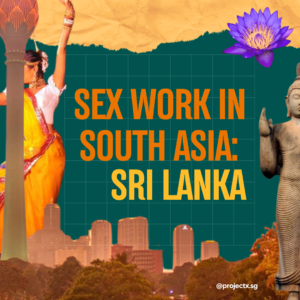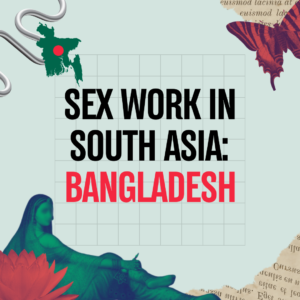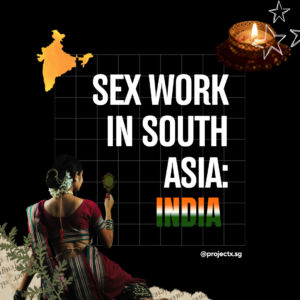Preface
This is the final post in Project X’s new series ‘Sex work in ASEAN nations’ – a series designed to encourage greater understanding of, and dispel common myths about, sex work in the region. This series will consider the state of the sex industry and sex workers’ rights in each of the 10 ASEAN countries. It will consider the unique historical, cultural, political and economic circumstances of that country, as well as why the decriminalisation of the industry is crucial for the region’s economic and political development.
A Brief History of Sex Work in Malaysia
Malaysia is a nation with a complex history of colonisation. From 1511 onwards, Malaysia was colonised by numerous European powers. In 1511, Malacca fell into the hands of the Portuguese which marked the beginning of the colonial era in Malaya (Mygov, n.d.). Following this, Malaya fell into the hands of the Dutch in 1641 and the British in 1824 through the Anglo–Dutch Treaty. British colonisation was the longest and most impactful period of colonisation and the British were the final colonial power to rule the territory before its independence in 1957 (Reuters, 2007). Hence, many regulations and laws around sex work in Malaysia are legacies of those instituted during the British colonial administration.
The sex industry is believed to have emerged as early as 1718 during the Dutch occupation of the peninsula (Noor and Hamid, 2019). However, it is suggested that brothels began to thrive later on during the period of British occupation. This was largely due to a gender imbalance between migrant workers who were brought by the British to the peninsular to work in the mines and on plantations (Noor and Hamid, 2019). This ‘lopsided sex ratio’ (Ong, 1994), resulted in a high demand for sexual labour (Manderson, 2002). In response, the ‘Contagious Disease Ordinance 1870’ (hereafter ‘CDO’) was passed by the British colonial government. The CDO established designated red-light districts, a system of registration for sex workers and a compulsory medical examination scheme (Warren, 1990). The ordinance was repealed less than 20 years later in 1888. After which, in 1931, new legislation was passed which criminalised sex work entirely. (Noor and Hamid, 2019).
Law, Policy, Policing
Presently, sex work itself is not an offence in Malaysia. However, this historical criminalising attitude towards sex work remains, and numerous offences that are ancillary to the sale of sex are still illegal. The laws specific to sex work in Malaysia can be found in the Penal Code. The following sections of the Code stipulate the acts which are criminalised:
So whilst there is no offence for engaging in sex work specifically, the combined effect of these laws means that it is practically impossible to lawfully engage in sex work. If sex workers cannot advertise their services or enjoy the earnings of their work – it makes their work futile. Moreover, these laws mean that both the police and the judiciary wrongly see sex work as a crime. As Malaysian criminal lawyer, Rajsurian Pillai explains “… unfortunately … what the courts hear or what the police think in their mind is, ‘Oh, you are a prostitute, that means you were prostituting. Therefore, that’s a crime.’” (Pillai, 2021).
Additionally, under the ‘Minor Offences Act 1955’ there is an offence specific to sex workers which makes “prostitutes behaving in a disorderly or indecent manner in or near any public road or in any place of public resort” a public order offence (Global Network of Sex Workers, 2021). The wide scope of this Act means that sex workers are always vulnerable to arrest when in a public space.
Within Malaysia, some states apply Sharia law. State-level Sharia laws which may be applied to Muslim sex workers and clients include zina (adultery) and khalwat (being alone with someone of the opposite sex who is not a spouse or relative) (Global Network of Sex Workers, 2021). In 2017, the state of Kelantan passed an umbrella law to introduce caning for those who break Sharia law (Worley, 2017). While these laws are not specific to sex workers, sex workers may also be subject to the canings due to the ambiguity around the specific actions that existing Sharia laws criminalise. Sharia laws can also criminalise the actions of trans women. For instance, trans women can be arrested for ‘posing as a woman’ which is sometimes used to criminalise both gender identity and sex work (Pillai, 2021) for the case of transgender sex workers. Although then-Deputy Prime Minister Dr Ahmad Zahid Hamidi stated that the law “may only apply to Muslims in Kelantan” (Worley, 2017), it’s important to note that whilst Sharia laws only apply to Muslims, the combination of criminal law, public order offences and Sharia law means that sex work is criminalised for cisgender and trans women, as well as for Muslims and non-Muslims alike. Furthermore, the law makes provisions for canings to be held inside prisons, or outside, in the public (Worley, 2017). Hence, sex workers may also face the danger of having their identities revealed in the event of arrest.
Sex Worker Statistics & Their Economic Impact
Developing reliable and accurate figures on the number of sex workers in Malaysia remains a challenging task for the country (Hassandarvish, 2021). Official statistics provided by the Health Ministry in 2018 estimated that there were some 45,000 sex workers in Malaysia (Hassandarvish, 2021). Whilst this figure seems quite low compared to unofficial estimates which put the figure closer to 150,000 sex workers (Soon, 2014), the Health Ministry statistics do provide some interesting insights into the Malaysian sex industry. Of the 45,000 sex workers counted, the Ministry recorded 21,000 cisgender, female sex workers, and 24,000 transgender sex workers. Additionally, non-government statistics also show that the majority of sex workers in the country are from other countries such as China, Indonesia, India and the Philippines (Suppiah and Kaur, 2018). So, what can be deduced from these stats is that the sex worker population in Malaysia is diverse, although exact figures and percentages are open to debate.
Whether the true number of sex workers in Malaysia is 45,000, 150,000 or somewhere in between, this small workforce has a significant economic impact on the country (Lim, n.d.). According to Havoscope, the sex industry is a major contributor to Malaysia’s informal economy and is worth a staggering US$963 million (equivalent to RM3.2 billion), thereby placing the country at 17 out of 26 countries with the highest revenues from sex work (Soon, 2014).
Additionally, an International Labour Organisation report of four countries (Indonesia, Malaysia, the Philippines and Thailand) argues that government recognition of the economic impact of the sex industry is crucial. The report contends that this recognition could improve the lives of between 800,000 to one million people who are paid for sexual services in the four countries of the study (Marican and Mohamed, 2009). One of the most interesting points made in the report is that each direct sex job (like those of people doing sex work) creates approximately seven other jobs outside the sex industry (Marican and Mohamed, 2009). The same report explains that ‘among the millions of other workers implicated in the sex sector are business owners and managers, mamasans, pimps and procurers, cleaners, waiters, cashiers, parking valets, security guards, vendors of food, tobacco, liquor, cosmetics and clothing, stylists, property owners, travel agencies, taxi and hotel room services and white-collar professionals such as lawyers and accountants’ (Lim, 2003).
Malaysian Culture, Religion, and Social Norms
Whilst Malaysia was founded as a secular state, Article 3 of the 1957 Constitution privileges Islam as ‘the religion of the Federation’. Whilst the word ‘official’ is not explicitly used within the Constitution, the fact that Islam is singled out as the national religion shows the impact that Islam can have on the lives of Malaysian citizens. Article 11(1) also reaffirms the supremacy of Islam under the Federal Constitution (Mohamed, 2018). The primacy of Islam within Malaysia has even been emphasised within judgments of the Federal Court. In Che Omar bin Che Soh v Public Prosecutor [1988] 2 MLJ 55 the court opined that “there can be no doubt that Islam is not just a mere collection of dogmas and rituals, but a complete way of life covering all fields of human activities, may they be private or public, legal, political, economic, social, cultural, moral or judicial” (Mohamed, 2018). So whilst Article 3 of the Constitution does ensure citizens the right to practise other religions, Islamic rules and values can be seen to permeate all levels of Malaysian culture, law and society. Nonetheless, it must be recognised that the state and religious civil groups, such as Sisters in Islam, view right-wing theocracy that accuses the state judiciary of failing to uphold Sharia as a threat to societal balance (Shamsuddin, 2024). However, to challenge the effectiveness of right-wing efforts to increase punitive measures for moral crimes, the Malaysian government would have to explore non-punitive methods to solve social issues– potentially minimising how punishment and social policies are viewed as mutually inclusive. (Shamsuddin, 2024) State institutions would then be released from the pressure to intensify punitive measures as a way to prove their efficacy in addressing moral crimes.
Nearly two-thirds of Malaysians identify as Muslim (Scroope, 2020). However, beyond just Islam, religion is common in Malaysia with a significant minority of Malaysians identifying as Buddhist (19.8%), Hindu (9.2%), and 6.3% or with a traditional Chinese religion such as Confucianism or Taoism (6.3%). Consequently, religious values (though particularly Islamic values) affect dominant perceptions pertaining to sex workers.
Transgender persons in Malaysia are likely to engage in sex work due to a lack of work opportunities caused by the country’s moral atmosphere. In 2018, there were an estimated 15,000 transgender sex workers in Malaysia, as compared to the estimated 22,000 cisgender female sex workers in Malaysia (Ministry of Health Malaysia, 2018), indicating a greater proportion of the transgender population than the cisgender female population involved in sex work. This overrepresentation may be attributed to how transgender women are perceived in Malaysian society as having violated Islam tenets forbidding men from “behaving like females, i.e. dressing, putting on make-up, using hormones to enlarge their breasts or sex reassignment surgery (Y.K Teh, 2001).” (Afiqah & Rashid, 2023, p.1). The degree of discrimination is extremely strong, with Malaysia being deemed the “second worst country in the world” for transgender persons by the Global Trans Rights Index for its lack of job opportunities and the criminalisation of transgender persons (Morden, 2023). In a qualitative study, transgender women in Northern Malaysia mainly cited financial reasons for turning to sex work (Afiqah and Rashid, 2024). For some, sex work becomes a viable method to supplement their income when they are forced to move out, hold unsteady jobs, or face rejection from employers (Afiqah and Rashid, 2024). Hence, societal discrimination manifesting in unequal opportunities for transgender persons pushes them towards sex work.
Within Islam, sex before marriage is seen as sinful and an ‘immoral act’ (Matthews and Pilcher 2023). Moreover, within Malay traditional culture, women must remain chaste and virtuous and a ‘good, moral woman’ should maintain her virginity until marriage (Karim, 1987).
According to Pertubuhan Kesihatan dan Kebajikan Umum Malaysia (PKKUM), an umbrella network for community-based sex workers,
“Religion is one of those institutions that frown against sex work and the community are judgmental and sometimes they even use religious texts to bash people who are in this industry”
Additionally, cultural values about virginity, modesty and the role of women all play a role in the stigmatisation of sex workers within Malaysia.
The Hope for Law Reform
In Malaysia, a combination of laws, religious rules and cultural beliefs intersect and play a role in the stigmatisation of sex workers. Sex workers are often on the receiving end of discrimination and experience numerous injustices (Pillai, 2021). Consequently, within Malaysia (as with other nations examined in this series), it is first necessary to conceptualise an attitudinal shift within society. Sex work is work and Malaysian sex workers contribute in significant ways to the country’s economy; through both GDP contribution and the creation of ancillary jobs outside of the sex industry. Those wanting to be allies to sex workers should make active efforts to advocate for the conceptualisation of sex work within a labour paradigm, rather than through a moral (or religious) lens.
According to Pertubuhan Kesihatan dan Kebajikan Umum Malaysia (PKKUM), “Discrimination and criminalisation still remain as a major challenge for sex workers in Malaysia. Criminalisation drives sex workers underground and brings a lot of stigma….” (Global Network of Sex Workers, 2021). Whilst the ultimate goal for those seeking law reform would be the repeal of Section 372B and other laws which target sex workers, getting there requires significant momentum and support (Pillai, 2021). Legal reform requires work and engagement by organisations and ordinary citizens in order for long-term change to be possible. Reflecting on personal and cultural values and finding new ways to view sex work is crucial.
References:
- Afiqah, S. N., & Rashid, A. (2024). Trans Women Sex Workers in Northern Malaysia: A qualitative study. Current Research Journal of Social Sciences and Humanities, 6(2), 207–218. https://doi.org/10.12944/crjssh.6.2.06
- Agustín , L.M. and Weldon, J. (2003) The Sex Sector: A victory for diversity, Global Network of Sex Work Projects. Available at: https://www.nswp.org/zh-hans/node/530 (Accessed: 16 May 2023).
- Chronology – Malaysia, fifty years of Independence (2007) Reuters. Available at: https://www.reuters.com/article/idINIndia-29185820070828 (Accessed: 16 May 2023).
- Davis, N.J. and Ong, J.H. (1994) ‘Singapore’, in Prostitution: An international handbook on trends, problems, and policies. Westport, CT: Greenwood Press.
- Disease Control Division, & Sector HIV/ STI/ Hepatitis C Section, Size of key populations in Malaysia – 2018 estimates (2018). Retrieved March 13, 2024, from file:///Users/user/Downloads/PSE_in_Malaysia_2018.pdf.
- Hassandarvish, M. (2021) ‘victims of violence’: Malaysian sex workers shed light on harsh realities forcing them into the industry, Yahoo! News. Available at: https://malaysia.news.yahoo.com/victims-violence-malaysian-sex-workers-051335299.html?guce_referrer=aHR0cHM6Ly93d3cuZ29vZ2xlLmNvbS8&guce_referrer_sig=AQAAACBjgPxOsv_7LzghIjUDFjN9Bzk54k4N3HbbfFNmcU7QvEN3P84SqsyF_1PmglIJtZKYm-VikrIv4lWmTD5cQk4uxTo1thkPZGSbwNNSgAw5z5o-Lu4DJU_M0V4q4fnX-zCqKQEk5sqqxb0gW0aOBcQNfUohcCCXDtfTsoQMCXH7&guccounter=2#:~:text=Developing%20reliable%20and%20accurate%20figures,and%2024%2C000%20transgender%20sex%20workers (Accessed: 16 May 2023).
- Karim, W.-J. (1987) ‘The Status of Malay Women in Malaysia: From Culture to Islam and Industrialization’, International Journal of Sociology of, 1. doi:137.132.123.69.
- Malaysia (2021) Global Network of Sex Work Projects. Available at: https://www.nswp.org/country/malaysia (Accessed: 16 May 2023).
- Manderson, L. and Wordboys, M. (2002) ‘Migration, Prostitution and Medical Surveillance in Early Twentieth-Century Malaya’, in L. Marks (ed.) Migrants, Minorities and Health: Historical and Contemporary Studies. Routledge.
- Marican, S. and Mohamed, M.N. (2009) ‘Estimating the number of sex workers in Malaysia’. Kuala Lumpur: World Health Organization. Regional Office for the Western Pacific.
- Matthews, D. and Pilcher, J. (2023) Uncovering the secret religious and spiritual lives of sex workers, The Conversation. Available at: https://theconversation.com/uncovering-the-secret-religious-and-spiritual-lives-of-sex-workers-195126 (Accessed: 16 May 2023).
- Mohamed Adil, M.A. (2018) Is Malaysia a secular state? , New Straits Times. Available at: https://www.nst.com.my/opinion/columnists/2018/12/444567/malaysia-secular-state (Accessed: 16 May 2023).
- Morden, Z. (2023, June 13). Malaysia ‘second worst country’ for transgender community, study finds. Malay Mail. Retrieved March 13, 2024, from https://www.malaymail.com/news/malaysia/2023/06/13/malaysia-second-worst-country-for-transgender-community-study-finds/72841.
- Nasir, R. et al. (2010) ‘Self-esteem and cognitive distortion among women involved in prostitution in Malaysia’, Procedia – Social and Behavioral Sciences, 5, pp. 1939–1944. doi:10.1016/j.sbspro.2010.07.392.
- Noor, N. and Hamid, B.A. (2019) ‘Representation of sex workers in Malaysian News Media: A critical discourse analysis’, The European Proceedings of Social and Behavioural Sciences [Preprint]. doi:10.15405/epsbs.2020.10.02.1.
- Pertubuhan Kesihatan Dan Kebajikan Umum Malaysia (PKKUM) (2020) Global Network of Sex Work Projects. Available at: https://www.nswp.org/featured/pertubuhan-kesihatan-dan-kebajikan-umum-malaysia-pkkum (Accessed: 16 May 2023).
- Pillai, V. (2021) All you want to know about sex work in Malaysia, Queer Lapis. Available at: https://www.queerlapis.com/sexwork4faq/ (Accessed: 16 May 2023).
- Purcell, V. (1948) The Chinese in Malaya. London: Oxford University Press.
- Shamsuddin, A. (2024, February 23). Malaysia’s court system struggles with the rise of state-level theocracy. The Diplomat. Retrieved April 3, 2024, from https://thediplomat.com/2024/02/malaysias-court-system-struggles-with-the-rise-of-state-level-theocracy/.
- Scroope, C. (2020) Malaysian culture – religion, Cultural Atlas. Available at: https://culturalatlas.sbs.com.au/malaysian-culture/malaysian-culture-religion (Accessed: 16 May 2023).
- Soon, T.W. (2014) Prostitution In Malaysia: A Taboo Subject That Is Surprisingly Big Business, Malaysiandigest.com. Available at: http://www.malaysiandigest.com/features/522410-prostitution-in-malaysia-a-taboo-subject-that-is-surprisingly-big-business.html (Accessed: 16 May 2023).
- Summary Of Malaysia’s History (no date) Mygov – the government of Malaysia’s Official Portal. Available at: https://www.malaysia.gov.my/portal/content/30120 (Accessed: 16 May 2023).






